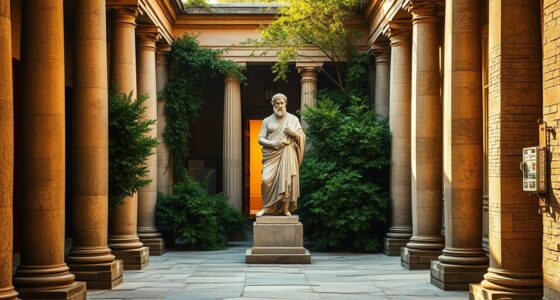When Carneades visited Rome, he challenged the Senate’s confidence in certainty and moral dogma by promoting skepticism rooted in perpetual inquiry. His arguments questioned the absolutes upheld by Stoics and Epicureans, exposing the fragility of claims to knowledge and moral truth. This encounter sparked a shift in Roman thought, encouraging humility and openness to doubt. If you want to understand how this moment reshaped philosophical outlooks, there’s much more to explore.
Key Takeaways
- Carneades challenged Roman Stoic certainties by demonstrating the relativity and fallibility of human knowledge during his debates.
- His skepticism questioned the moral and natural laws upheld by the Roman Senate, causing philosophical upheaval.
- The debates promoted humility and doubt, undermining the Roman confidence in moral and epistemic certainty.
- Carneades’s approach highlighted human limitations, prompting Romans to reconsider the basis of truth and moral guidance.
- His skeptical critique marked a pivotal moment, shaking traditional Roman views and encouraging a more cautious, reflective stance on knowledge.

When Carneades arrived in Rome, he brought with him the formidable challenge of introducing Greek skepticism to a city rooted in Stoic and Epicurean philosophies. The Roman Senate, deeply influenced by Stoic ideals, favored a worldview emphasizing moral duty, natural law, and the pursuit of virtue through certainty. Epicureanism, meanwhile, had gained popularity among some circles, promoting the pursuit of pleasure and the avoidance of pain as the path to happiness. Amid this backdrop, Carneades aimed to disrupt the prevailing complacency by questioning the very foundations of certainty and truth, advocating for a more skeptical approach rooted in Academic skepticism. You quickly realize that the Stoic influence on Roman intellectual life is profound. The Stoics believed in the possibility of attaining moral and natural truths through reason, fostering an optimistic confidence in human capacity for knowledge. Carneades, however, challenged this confidence by arguing that certainty was often illusory. He emphasized that human perceptions are fallible, and that our judgments, no matter how well-reasoned, can be mistaken. This stance directly confronts the Stoic trust in rational clarity and moral certainty, forcing you to reconsider whether absolute knowledge is attainable. His skeptical approach, often associated with the Academic skeptics, advocates for withholding assent when evidence is insufficient, promoting a stance of perpetual inquiry rather than dogmatic certainty. Moreover, Carneades’s method of argumentation often involved demonstrating the equally plausible opposing views, highlighting the relativity of knowledge and the importance of humility in philosophical inquiry. As Carneades debates with Roman philosophers and senators, you observe him carefully dismantling claims of absolute truth. His arguments reflect a core tenet of Academic skepticism: even the most seemingly evident beliefs are open to doubt. He questions whether the Stoics’ confidence in natural law and moral truths can withstand rigorous scrutiny, emphasizing that human limitations prevent us from ever achieving complete certainty. In doing so, Carneades doesn’t dismiss the importance of moral life but suggests that moral claims, like all other knowledge, should be approached with humility and openness to doubt. His rhetorical skill lies in exposing the fragility of supposed certainties and encouraging a more cautious, reflective stance toward knowledge. You see that this skepticism unsettles the Roman audience, who are used to a worldview that offers clear, moral guidance. Carneades’s arguments promote intellectual humility, urging Romans to accept the limits of human understanding. By doing so, he introduces a philosophical perspective that questions the very basis of certainty cherished by the Stoics and Epicureans alike. His presence at Rome marks a pivotal moment: a philosophical shake-up that challenges the assumption that truth is always within our grasp, shaking the foundation of Roman intellectual tradition and leaving a lasting impression on its approach to knowledge and morality.
Frequently Asked Questions
What Specific Arguments Did Carneades Use Against the Stoics?
You wonder what arguments Carneades used against the Stoics. He challenged their claims with skeptical arguments, questioning the certainty of their positions. Carneades pointed out that Stoic rebuttals often relied on assumptions that could be disputed, emphasizing the limits of human knowledge. His approach highlighted that certainty is elusive, encouraging others to suspend judgment rather than accept dogmatic beliefs, making his skeptical arguments a powerful challenge to Stoic philosophy.
How Did Roman Senators React to Carneades’ Skepticism?
Imagine you’re in the Senate, witnessing Carneades challenge their beliefs with sharp skepticism. The senators, initially defensive, slowly grow intrigued, but many fear losing moral clarity. They react with a mix of surprise and unease, unsure how to handle his diplomatic strategies. Public opinion shifts as Carneades’ arguments spark debate, making senators question long-held dogmas. Ultimately, their reaction reveals a profound tension between tradition and the new skeptical outlook he introduces.
Was Carneades Involved in Any Political Controversies in Rome?
You might wonder if Carneades was involved in political controversies during his time in Rome. While he’s best known for philosophical debates that challenged traditional views, there’s little evidence he engaged in direct political controversies. Instead, he focused on philosophical skepticism, which influenced Roman thinkers and stirred debates among senators. His role was more intellectual than political, though his ideas occasionally sparked controversy in the political arena.
Did Carneades Influence Roman Philosophical Thought Beyond Skepticism?
You might wonder if Carneades impacted Roman philosophical thought beyond skepticism. His influence extended through ancient debates, inspiring Roman thinkers to question dogma and explore new ideas. Carneades’s emphasis on critical thinking and probabilistic reasoning challenged traditional views, fostering a more open philosophical environment. As a result, his ideas contributed to the development of Roman philosophy, encouraging a more skeptical and inquiry-driven approach that resonated well beyond his time.
How Long Did Carneades’ Impact Last in Roman Intellectual Circles?
Imagine a gentle ripple that leaves a lasting impression; that’s how Carneades’ philosophical legacy subtly shaped Roman thought. Your curiosity about his impact reveals his timeless intellectual influence, which persisted well beyond his lifetime. For generations, his skepticism encouraged questioning and debate, enriching philosophical discourse. Though the direct influence waned, his ideas continued to inspire thinkers, ensuring his impact endured in Roman and broader philosophical circles for centuries.
Conclusion
As you imagine that historic day, you feel the weight of skepticism cracking the marble walls of the Senate. Carneades’s words ripple like a storm, stirring doubt and reflection within your very core. It’s as if a lightning bolt struck the foundation of certainty, igniting a fire of curiosity that burns brightly inside you. That moment, fleeting yet powerful, reminds you that truth is a flame forever flickering, waiting for those brave enough to chase its elusive glow.









